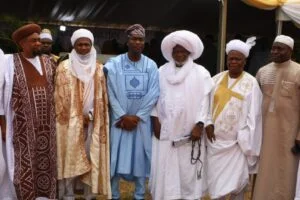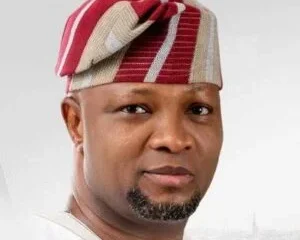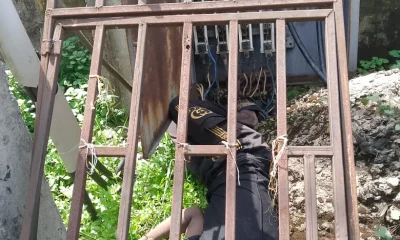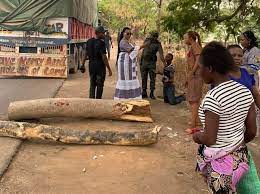Foreign News
Nigeria, Ghana Other African Countries Urge USA to Hands- Off Cuba
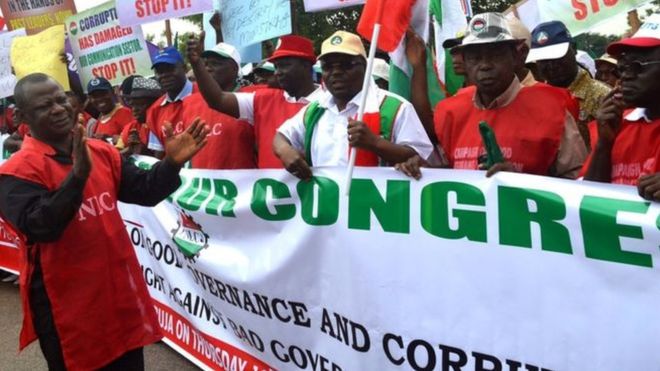
By Gom Mirian, Abuja
Four African nations, including Nigeria, Ghana, Tanzania and Gambia on Monday converged on Abuja to join their voices in demand for the lifting of sanctions imposed on the Republic of Cuba by the United States of America(USA).
The president of the Nigerian labour congress (NLC), Comrade Ayuba Wabba said this at the opening ceremony of the 6th Solidarity with Cuba meeting held at Yar’Adua Centre, to pressure the USA government to lift its over 50-year blockade on Cuba.
The three days event is expected to end on Wednesday, September 25, with a solidarity protest march to the USA Embassy in Nigeria with the demand to the USA government to ‘Hand Off Cuba”.
According to Comrade Waba, the celebration of Cuba and its friendship with the African people cannot be complete without speaking up strongly for them.
He said motivation for the meeting was to affirm international support and solidarity with Cuba and to demand respect for Cuba’s right to self-determination and sovereignty.
“For the umpteenth time, we call on the United States and its western allies to lift the economic blockade against the people of Cuba.
“The thought that Cuba will collapse after a few years has now been debunked by the resilience of the Cuban people these past sixty years and counting.
“We believe that if the Cuban people and government could build such great education, health and public service institutions in spite of decades of blockade, Cuba will compete with the most advanced countries of the world if the prison doors are opened.
“We also call on western countries to quit interfering in the sovereignty of nations.”
Wabba added that Africa was not in true solidarity with Cuba if she fails to show love to other Africans.
He noted that the recent xenophobic attacks in South Africa would not have happened, if the region truly share in the Cuban ideals of a shared humanity.
Also speaking, the Minister of Science and Technology, Dr Ogbonnaya Onu, noted that Cuba had made efforts in times past to help African countries in their time of need.
Onu said the NLC has shown commitment with the solidarity mandate, thanking the union for efforts to raise consciousness about the sacrifice of Cuba for independence of some countries.
The Minister noted that during the Ebola pandemic, Cuba sent no fewer than 400 doctors to African countries to curb the spread, calling on Nigerians to imbibe culture of patriotism and self reliant.
“Nigeria must do more to lead Africa and other countries globally, we must put the Xenophobic attack from South Africa aside and provide the needed leadership for liberation of Africa.
” When we do this, it will help to provide leadership, a new civilisation to rise, stronger and respected all over the world.
In his remarks, the chairman of the occasion, Mr. Dipo Fashina, said “we have to cement our belief that Cuba must be defended. Cuba must surmount the revolution there.
Foreign News
Israeli Forces Vow Response to Iran’s Attack Despite Calls for Restraint

Israelis awaited word on how Prime Minister Benjamin Netanyahu would respond to Iran’s first-ever direct attack as international pressure for restraint grew amid fears of an escalation of conflict in the Middle East.
Netanyahu on Monday summoned his war cabinet for the second time in less than 24 hours to weigh a response to Iran’s massive weekend missile and drone attack, a government source said.
While the attack caused no deaths and little damage, thanks to the air defences and countermeasures of Israel and its allies, it has increased concerns that violence rooted in the Gaza war is spreading, and fears of open war between the long-time foes.
Israeli military chief of staff Herzi Halevi said on Monday that “this launch of so many missiles – cruise missiles and drones – into Israeli territory will be met with a response” but gave no details.
Iranian Deputy Foreign Minister Ali Bagheri Kani told state TV on Monday night that Tehran’s response to any Israeli retaliation would come in “a matter of seconds, as Iran will not wait for another 12 days to respond”.
But the prospect of Israeli retaliation has alarmed many Iranians already enduring economic pain and tighter social and political controls since protests in 2022-23.
Iran launched the attack in retaliation for an airstrike on its embassy compound in Damascus on April 1 attributed to Israel, and signalled that it did not seek further escalation.
U.S. President Joe Biden told Netanyahu at the weekend that the United States, which helped Israel blunt the Iranian attack, would not participate in an Israeli counter-strike.
Since the war in Gaza began in October, clashes have erupted between Israel and Iran-aligned groups based in Lebanon, Syria, Yemen, and Iraq.
Israel said four of its soldiers were wounded hundreds of metres inside Lebanese territory overnight, the first known Israeli ground penetration into Lebanon since the Gaza war erupted, although it has traded fire with the Lebanese Hezbollah militia.
“We’re on the edge of the cliff and we have to move away from it,” Josep Borrell, the European Union’s foreign affairs chief, told Spanish radio station Onda Cero.
French President Emmanuel Macron, German Chancellor Olaf Scholz and British Foreign Secretary David Cameron made similar appeals.
Washington and UN Secretary-General Antonio Guterres also have called for restraint.
White House national security spokesman John Kirby declined on Monday to say if Biden had urged Netanyahu in talks on Saturday night to exercise restraint in responding to Iran.
“We don’t want to see a war with Iran. We don’t want to see a regional conflict,” Kirby told a briefing, adding that it was for Israel to decide “whether and how they’ll respond”.
Foreign Minister Israel Katz said he was “leading a diplomatic attack” alongside Israel’s military response, writing to 32 countries to place sanctions on Iran’s missile programme and proscribe its Revolutionary Guards Corps as a terrorist organisation.
U.S. Treasury Secretary Janet Yellen said Iran’s actions threatened stability in the Middle East and could cause economic spillovers.
The U.S. would use sanctions, and work with allies, to keep disrupting Iran’s “malign and destabilising activity”, she added.
However, some analysts said the Biden administration was unlikely to seek to sharpen sanctions on Iran’s oil exports due to worries about boosting oil prices and angering top buyer China.
In a call between the Chinese and Iranian foreign ministers, China said it believed Iran could “handle the situation well and spare the region further turmoil” while safeguarding its sovereignty and dignity, according to Chinese state media.
Russia has refrained from publicly criticising its ally Iran but has also warned against further escalation.
Iran’s retaliatory attack, involving more than 300 missiles and drones, caused modest damage in Israel and wounded a 7-year-old girl.
Most missiles and drones were shot down by Israel’s Iron Dome defence system and with help from the U.S., Britain, France and Jordan.
In Gaza itself, where more than 33,000 Palestinians have been killed in the Israeli offensive according to Gaza health ministry figures, Iran’s action drew applause.
Israel began its campaign against Hamas, the Iranian-backed Palestinian militant group that runs Gaza, after Hamas attacked Israel on Oct. 7, killing 1,200 people and taking 253 hostages, by Israeli tallies.
British Prime Minister Rishi Sunak said the Group of Seven major democracies were working on a package of coordinated measures against Iran.
Italy, which holds the rotating G7 presidency, said it was open to new sanctions and suggested any new measures would target individuals.
Iran’s attack prompted at least a dozen airlines to cancel or reroute flights, with Europe’s aviation regulator still advising caution in using Israeli and Iranian airspace. (Reuters/NAN)
Foreign News
50 killed in Afghanistan Road Accidents During Eid Holiday

No fewer than 50 people died and 185 others injured in road accidents during the four-day Eid el Fitr holiday
across Afghanistan.
The country’s General Directorate of Traffic Police on Monday said a total of 102 road accidents occurred across Afghanistan in the period, killing 50 commuters, including eight women and 13 children, and injuring 185 others.
Herat, Ghazni, and Paktika were among 34 provinces of the country where most of the road accidents took place, the department said.
Overspeeding, reckless driving, non-compliance to traffic rules, and lack of traffic signals on highways were the main causes of the deadly accidents, the government agency said.
(Xinhua/NAN)Foreign News
U.S. not Expecting to be Drawn into War but Predicts Attack by Iran Against Israel
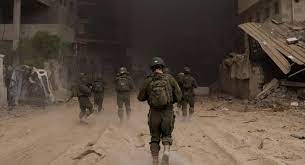
The United States expects an attack by Iran against Israel but one that would not be big enough to draw Washington into war, a U.S. official said late on Thursday.
The White House said earlier that Washington did not want conflict to spread in the Middle East and the U.S. had told Iran it was not involved in an air strike against a top Iranian military commander in Damascus.
The White House added it warned Iran to not use that attack as a pretext to escalate further in the region.
Suspected Israeli warplanes bombed Iran’s embassy in Damascus on Monday in a strike for which Iran has vowed revenge and in which a top Iranian general and six other Iranian military officers were killed, ratcheting up tension in a region already strained by the Gaza war.
Iranian sources told Reuters that Tehran has signalled to Washington that it will respond to Israel’s attack on its Syrian embassy in a way that aims to avoid major escalation and it will not act hastily, as Tehran presses demands including a Gaza truce.
The United States has been on high alert about possible retaliatory strikes from Iran and U.S. envoys have been working to lower tensions.
Palestinian Islamist group Hamas attacked Israel on Oct. 7, killing 1,200, according to Israeli tallies.
Israel’s military assault on Hamas-governed Gaza has since killed more than 33,000 people according to the local health ministry, displaced nearly all of Gaza’s 2.3 million population, caused a humanitarian crisis, and led to genocide allegations that Israel denies.
Iran-backed groups have declared support for Palestinians, waging attacks from Lebanon, Yemen, and Iraq.
Tehran has avoided direct confrontation with Israel or the United States, while declaring support for its allies. (Reuters/NAN)



